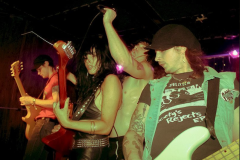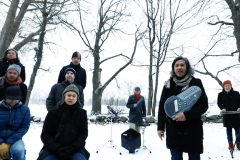From The Horse's Mouth: Dan Kaufman (Barbez) on Bella Ciao
Despite the tragedy of the Holocaust and the pre-war merging of Italian Jewish liturgical traditions in Rome’s main synagogue, the beguiling melodies of Rome’s Jews survived. The city’s oldest continuous residents, Jews first immigrated to Rome more than two thousand years ago; their arrival predates the destruction of the Temple in Jerusalem and the diaspora that followed.
Through the centuries, Roman Jews maintained an identity distinct from Sephardi and Ashkenazi cultures, and their music, too, remained singular and mysterious. This music was preserved in part by a visionary Italian ethnomusicologist named Leo Levi (the Alan Lomax of Italy) who recorded elderly Roman Jews singing these rites after the war. Other scholars, most notably, Elio Piattelli have transcribed these Roman Jewish melodies, but they have now largely disappeared from the living world.
Bella Ciao is the fifth full-length album from Brooklyn’s Barbez. Bella Ciao was influenced by the traditional music of Roman Jews, and inspired by the legacy of the Italian Resistance during World War II, which was inextricably interwoven with the Nazi’s attempt to exterminate Rome’s Jews. Bella Ciao is being released by John Zorn’s Tzadik label.
Ghettoblaster recently caught up with Dan Kaufman of Barbez to discuss the record. This is what he shared.
When did you begin writing the material for your most recent album?
I began writing this music in 2009.
What was the most difficult song to take from the initial writing stage through recording and mixing? Why was it so troublesome?
“Bella Ciao”, the title track. The song has such a profound meaning in Italy (and the world). It’s a partisan song from World War II and there are hundreds of versions. I wanted to make it unique to us, but still keep the song’s spiritual intensity and meaning.
Which of the songs on the record is most different from your original concept for the song?
“Shema Koli”, the first track. It was originally conceived for a different project and then I heard one of these Roman Jewish melodies and realized that it would work, and in fact be stronger in this very different context. So it was quite radically re-imagined.
Did you have any guest musicians play or sing on the record?
There are three amazing guests on the record: Dawn McCarthy, who sings two songs, Fiona Templeton, who reads two Italian Resistance poems, and Dan Coates who plays electronics.
Who produced the record? What input did that person have that changed the face of the record?
The record was produced by myself and Martin Bisi, though he does not like to take that title. He recorded and mixed the record and in that process he and I shaped the sound and direction of each track. A thousand decisions were made in relations to each song, from edits, to the drum sound, to more philosophical matters, like the song’s meaning in relation to the overall record.
Is there an overarching concept behind your new album that ties the record together?
The songs are all based on Roman Jewish melodies. These melodies are the musical expression of the Roman Jewish community, the oldest Jewish community in Europe, who first came to Rome more than 2000 years ago. The music is also inspired by the memory of the Italian Resistance during the Second World War. The title track, “Bella Ciao”, is a partisan anthem of that time and there are poems by Pier Paolo Pasolini and Alfonso Gatto that express the human struggle of that time.
Have you begun playing these songs live and which songs have elicited the strongest reaction from your fans?
We have been playing them live and the reaction depends on the night, but some of the songs that usually really hit people are “Yoshev Beseter Elyon”, “Shema Koli”, “Umevi Goel”, and “Bella Ciao”.









Social Media